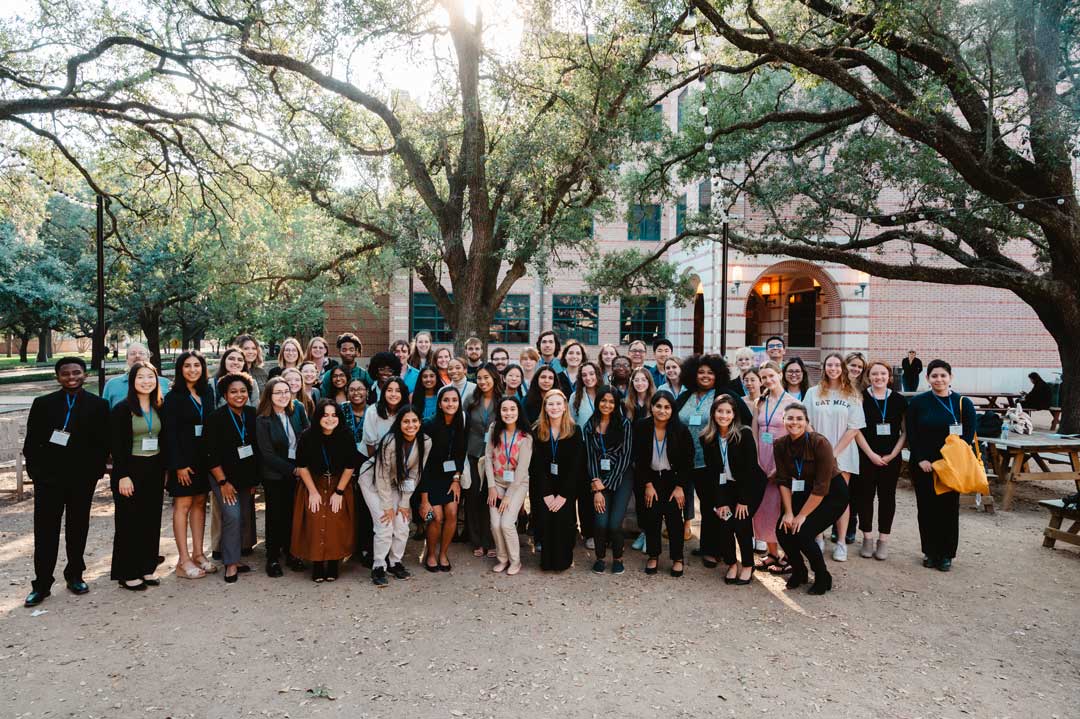In 2019, I was a senior undergraduate student in a small town in Illinois when I received an email from someone at Rice University in Houston, TX inviting me to apply to the “Gulf Coast Undergraduate Research Symposium.” Having never heard of this symposium, I did a quick Google search and found that this program (GCURS) was an annual event hosted by Rice where undergraduate students from around the country (and even the world!) present their research to other students, faculty, and staff. After a bit more research, I decided to apply and, to this day, I am so thankful that I made the decision to apply and ultimately attend this program! In this blog, I will share my experience with GCURS, how it benefitted me, and why you should consider applying.
What is GCURS?
The Gulf Coast Undergraduate Research Symposium (GCURS) is a unique presentation showcase for undergraduate research, with the biggest rule being “no posters allowed!” As an undergrad, I had attended a few national conferences but had always been limited to presenting my work as a poster. When the opportunity to present my work as an oral presentation came about, I was really excited! Even better, every presenter receives feedback from current Rice faculty and graduate students in their section. Not only did I get to share my work with prestigious scholars, but I also got written suggestions on improving my research results and presentation skills while adding a unique and valuable credential to my CV.
But GCURS is more than just a series of oral presentations.
GCURS is also a place where undergrads can connect with other students passionate about their research from around the world. I met folks coming from California, Texas, New York, Illinois, Mexico–and that was just in the chemistry section! GCURS also provides a platform for interdisciplinary connections, allowing me to meet students in materials science, engineering, and other STEM fields related to my research. This way, GCURS fosters collaboration and intellectual growth among young scholars.
Why should I apply?
For me, GCURS was an opportunity to learn more about Rice and the research programs it offers for graduate school and to get an “early visit” to a potential graduate school. After the presentations were finished for the day, I joined other presenters in exploring some local Houston neighborhoods for food and drinks. This gave me a sense of what the city is like outside of the academic aspects of the symposium.
Additionally, attending the symposium allowed me to speak with Rice faculty and students, expanding my network. I was able to learn more about Rice’s research and facilities while getting to experience the environment for myself. I also enjoyed putting together a research talk and presenting it to a group of complete strangers – this experience boosted my confidence in giving scientific presentations while getting input about how to continue working on my project.
Final Thoughts
I highly recommend that any undergraduate student passionate about their research and considering graduate school apply to GCURS. Responding to an unexpected email led me to a graduate school that perfectly met my research interests while being a good fit outside of academics, too (that’s Rice!) However, the value of attending GCURS exceeds exploring one university. GCURS is about discussing science with like-minded people, which can lead to lasting friendships and connections. It’s a great opportunity to share your work and a unique experience that can provide a boost as you move into your future goals.
This year’s Gulf Coast Undergraduate Research Symposium (GCURS) will be held on Saturday, October 21st, with additional panels and workshops happening on Sunday, October 22nd, at Rice University in Houston, TX. This will be the 15th anniversary of this unique symposium! Some travel awards will be granted to qualified students. Applications to attend GCURS are now open and are due by September 10th!
About the author:
Carly Graverson is a current Ph.D. student in Chemistry. She got her B.S. in Chemistry at Lewis University in 2020. Read more.
Further Reading:
Questions for a potential advisor and their research team!
My GCURS Experience: Application Tips and Tricks
My GCURS Experience: Presenting Your Research

